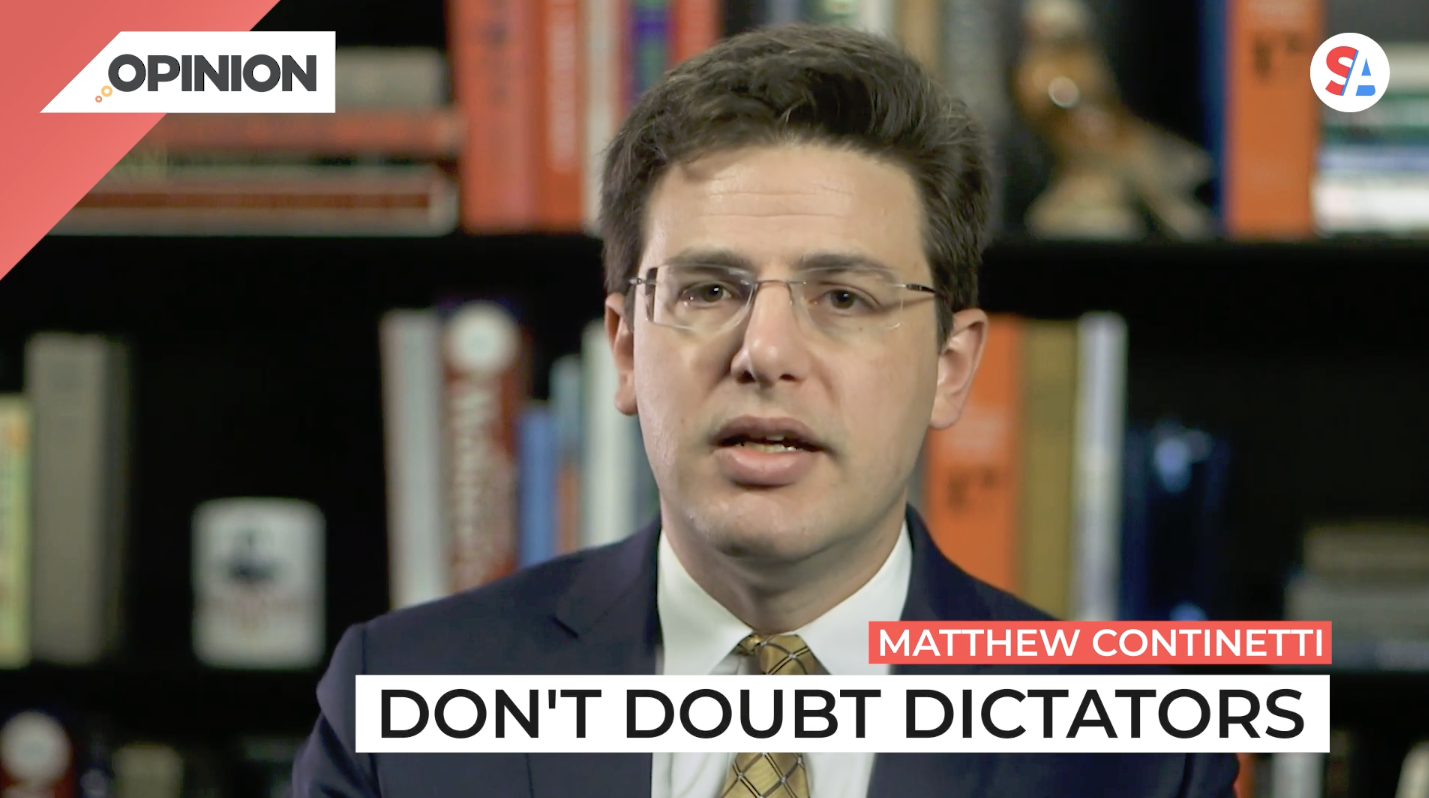
Commentary
-
Our commentary partners will help you reach your own conclusions on complex topics.
Some events seem impossible right up to the minute that they take place. The idea that terrorists might turn airliners into missiles, for example, was relegated to novels until the morning of September 11, 2001.
For decades, a global pandemic unleashing social, economic, and cultural havoc was the basis of science-fiction movie plots. Then the first case of Covid-19 was confirmed in the United States.
The Russian invasion of Ukraine is another crisis that looked like an unlikely prospect for months but now seems inevitable in retrospect.
Leading up to the war, President Biden and Secretary of State Antony Blinken issued warning after warning that Russia was preparing to attack its neighbor.
But it felt very unlikely for many. It is the 21st century, after all.
The experts said that Putin did not have enough troops to change the Ukrainian regime and occupy a sovereign nation. They said that U.S. intelligence had failed in the past and could well be wrong again.
They noted that Ukrainian President Zelenskyy was minimizing tensions.
They suggested that Putin, while a risk taker, was hardly the kind of maniac who would launch an invasion.
Putin chose war instead. He followed the logic he had made explicit many times before: that Ukraine is an illegitimate nation-state standing in the way of the “historical unity” of Russians and Ukrainians.
Despite Biden’s continued threat of sanctions, despite French president Macron’s shuttle diplomacy, Putin remained unmoved.
He continued to call democratic Ukraine fascist. He blamed America and the West for leaving him with no alternative to conquest. He said that he would “de-Nazify” a country with a Jewish president—and retaliate against any western nation that interfered.
In launching his war, Putin did exactly what he had shown every indication of preparing to do for some time.
Why, then, was it so difficult for so many experts to take him seriously? Why did so many of us look with incomprehension and disbelief upon his statements and actions in the final days before the beginning of his “special military operation”?
Why were we unable to assimilate into our picture of reality a dictator who would coldly unleash violence on 44 million men, women, and children?
When autocrats resort to violence, citizens of democracies that enjoy the rule of law are often shocked. For us, organized violence is rare. Terrible outcomes are uncommon. We rarely believe what our own elected officials say. Why should we take seriously the ravings of despots?
Well, it’s about time we started doing so. After Ukraine, we know that tyrants mean it when they make audacious claims and demand remarkable concessions.
They are not making empty threats. Many of us are just not listening.
After Ukraine, we cannot ignore Xi Jinping’s threats against Taiwan. After Ukraine, we need to listen to the Islamic Republic of Iran, whose supreme leader, Ayatollah Ali Khamenei, has spent decades calling for the end of Israel.
And yet, the same administration that was right about Putin’s intentions in Ukraine lives in la-la land when it comes to a theocracy whose malign behavior in the Middle East aims at the eradication of the Jewish state.
What proof is there that Xi Jinping and Ayatollah Khamenei are any less committed to their diabolical ideologies than Vladimir Putin is?
Why should we be less worried about a Chinese invasion of Taiwan or an Iranian attack on Israel than about Putin’s designs in Ukraine?
When strongmen tell you they are about to sow chaos, don’t close your ears. What they say might strike you as out of this world. It isn’t.
Don’t dismiss the leaders of rogue states. Don’t doubt them. Believe them.
-
What kind of leader America needs
The American public remains divided and unhappy about the state of the country leading up to the next presidential election, and former President Donald Trump now holds a narrow lead in the matchup against President Biden. While Biden portrays Trump as a threat to American democracy, voters in key states ironically trust the former president…
-
NATO is stronger now than ever before
The North Atlantic Treaty Organization (NATO) has been called the most powerful military alliance in world history, and serves as the bedrock of military security for Europeans, Americans and allied populations around the globe. The importance of the alliance has been reiterated by recent events, namely Russia’s invasion of Ukraine and increasing threats from China.…
-
Who will Trump pick for vice presidential running mate?
Donald Trump is now clearly on track to run as the GOP candidate for president in the 2024 elections, regardless of how his various criminal trials proceed. What’s less clear is who else might run as his running mate for the position of vice president. Straight Arrow News contributor Matthew Continetti reviews a list of…
-
Education, income becoming key variables in elections
Education, income level, geography, race and ethnicity are all key variables in estimating who voters might support. But the importance of these variables has changed in recent elections, as America’s demography, culture and political movements continue to evolve. Straight Arrow News contributor Matthew Continetti argues that education and income level have become more important than…
-
If we’re lucky, AOC and the Squad are on their way out
The Squad, comprised of eight left-wing House Democrats, has been openly critical of Israel both before and during Israel’s war with Hamas. As primaries approach, some of these House members are facing challenging political races. Straight Arrow News contributor Matthew Continetti delves into the backlash against the Squad and hopes its members will face a…
Latest Opinions
-
 U.S. Department of Defense
U.S. Department of Defense
Congress still trying to figure out how to reduce wasteful military spending
-
 DVIDS
DVIDS
US Navy, Air Force making waves with new weapons at RIMPAC
-
 Getty Images
Getty Images
Israeli PM Netanyahu meets with Trump at Mar-a-Lago
-
 Getty Images
Getty Images
Growing US nuclear power resurgence reaches the nation’s heartland
-
 Getty Images
Getty Images
Beer from the sun, other solar thermal projects get government funding
Popular Opinions
-
In addition to the facts, we believe it’s vital to hear perspectives from all sides of the political spectrum.


